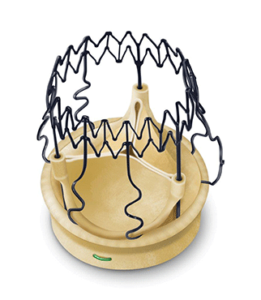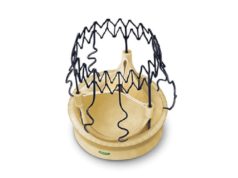
LivaNova have presented the first data from the Perceval sutureless implant versus standard-aortic valve replacement (PERSIST-AVR) clinical study at the 100th Annual Meeting of the American Association of Thoracic Surgery (AATS), which took place online 22–23 May 2020. A press release from the company announced that the study demonstrated that its sutureless surgical aortic valve, Perceval, is a reliable and essential technology to treat aortic valve disease.
Theodor Fischlein (Paracelsus Medical University [PMU] Cardiovascular Center, Nuremberg Clinic, Germany) presented the data. Commenting on the findings in the company statement, Fischlein says: “The PERSIST-AVR trial showed that in patients with severe symptomatic aortic valve stenosis who were undergoing open-heart aortic valve replacement, a sutureless valve was noninferior to stented valves with respect to major adverse cerebral and cardiovascular events (MACCE) at one year. These findings represent that Perceval should be considered as an important addition to any comprehensive valve programme.”
According to the press release, PERSIST-AVR is the first prospective, randomised, multicentre international trial comparing Perceval outcomes with those of standard sutured valves. From March 2016 to September 2018, 910 patients in 12 countries were enrolled in PERSIST-AVR. These patients had severe symptomatic aortic valve stenosis. They were undergoing open-heart aortic valve replacement (AVR), with and without coronary artery bypass grafting (CABG), and included patients receiving conventional or mini-sternotomy.
LivaNova states that Perceval was found to be noninferior to, or equally as safe and effective as, sutured AVR with respect to the primary endpoint demonstrating freedom from MACCE at 91.6% for the Perceval group and 92% for the sutured AVR group. Additionally, the rate of early death after one year was low (1% in both groups) considering the need for coronary artery bypass grafting in almost one-quarter of the patient cohort.
It says the study showed that the use of Perceval sutureless AVR resulted in significantly lower procedure times. Cardiopulmonary bypass procedure times for isolated AVR and AVR combined procedures were shortened by 22% and 18%, respectively. Cross-clamp time for isolated AVR and AVR combined procedures was reduced by 30% and 21%, respectively. Further, significant improvement of functional status after surgery (using the New York Heart Association Functional Classification) and benefits persisted at one year.
In the control arm of the study, various stented AVR models in five sizes were used based on surgeon preference. The sutureless valve arm used four sizes of Perceval valves. Importantly, no difference was found with regard to paravalvular and central leak, demonstrating that Perceval ensures sealing at the aortic annulus equivalent to sutured valves. The rate of reintervention, stroke, endocarditis or other valve-related complications was also low in both groups. Implant success rates were statistically comparable, validating that Perceval allows for a safe and reproducible implant procedure. PERSIST-AVR data showed a higher permanent pacemaker implantation (PPI) rate with sutureless valves compared to sutured AVR, especially for the largest size valve. PPI has been found to be substantially reduced with modified intraoperative approaches and an emphasis on proper valve sizing.
“The PERSIST-AVR data demonstrate that the Perceval sutureless aortic valve replacement is as safe and effective as traditional sutured valves. We are pleased with the findings from this important study, which validate many critical benefits of Perceval,” says Brian Duncan, vice president of medical affairs at LivaNova. “We continue to pursue innovation for our heart valve technologies and have introduced design enhancements with the next-generation Perceval Plus valve to mitigate PPI rates and further advance treatment of aortic valve stenosis. We are seeing very promising initial results, building on our strong body of evidence from clinical experience with Perceval, which now extends to more than 13 years.”












